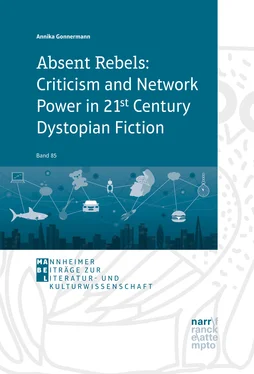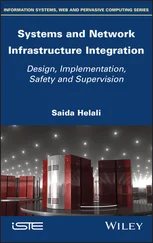Annika Gonnermann - Absent Rebels - Criticism and Network Power in 21st Century Dystopian Fiction
Здесь есть возможность читать онлайн «Annika Gonnermann - Absent Rebels - Criticism and Network Power in 21st Century Dystopian Fiction» — ознакомительный отрывок электронной книги совершенно бесплатно, а после прочтения отрывка купить полную версию. В некоторых случаях можно слушать аудио, скачать через торрент в формате fb2 и присутствует краткое содержание. Жанр: unrecognised, на английском языке. Описание произведения, (предисловие) а так же отзывы посетителей доступны на портале библиотеки ЛибКат.
- Название:Absent Rebels: Criticism and Network Power in 21st Century Dystopian Fiction
- Автор:
- Жанр:
- Год:неизвестен
- ISBN:нет данных
- Рейтинг книги:3 / 5. Голосов: 1
-
Избранное:Добавить в избранное
- Отзывы:
-
Ваша оценка:
- 60
- 1
- 2
- 3
- 4
- 5
Absent Rebels: Criticism and Network Power in 21st Century Dystopian Fiction: краткое содержание, описание и аннотация
Предлагаем к чтению аннотацию, описание, краткое содержание или предисловие (зависит от того, что написал сам автор книги «Absent Rebels: Criticism and Network Power in 21st Century Dystopian Fiction»). Если вы не нашли необходимую информацию о книге — напишите в комментариях, мы постараемся отыскать её.
Absent Rebels: Criticism and Network Power in 21st Century Dystopian Fiction — читать онлайн ознакомительный отрывок
Ниже представлен текст книги, разбитый по страницам. Система сохранения места последней прочитанной страницы, позволяет с удобством читать онлайн бесплатно книгу «Absent Rebels: Criticism and Network Power in 21st Century Dystopian Fiction», без необходимости каждый раз заново искать на чём Вы остановились. Поставьте закладку, и сможете в любой момент перейти на страницу, на которой закончили чтение.
Интервал:
Закладка:
We are naturally inclined to spy out in the contemporary arrangements of power a new and improved rendition of old and basically unchanged panoptical techniques. We tend to overlook the fact that the majority of the population has no longer either the need or the chance to be dragged through the drilling fields of yore. ( Globalization 49)
Having identified the wrong point of attack, i.e. dystopia’s continued focus on state structures and totalitarianism, Bauman continues to accuse dystopia of complicity.7 He insists that not posing the right questions, i.e. not addressing the most urgent issues, results in an escapist attitude legitimising the status quo: “not asking certain questions is pregnant with more dangers than failing to answer the questions already on the official agenda, [since] asking the wrong kind of questions all too often helps to avert eyes from the truly important issues” (ibid. 5; cf. also Schmeink, Biopunk 67). In this respect, the classical dystopian genre is doing its audience a great disservice, since a great deal of dystopian fiction can be accused of “not asking certain questions.” Young adult dystopias like Suzanne Collins’ The Hunger Games (2008) are enormously successful yet ignore the fact that the basis for dystopian fiction has changed. Big Brother and his alternative facts are no longer a source of fear or warning.8 On the contrary: “[w]e have met Big Brother, and he is us” (Grossman). This leads Ulf Abraham to conclude that “these works of fiction seem rather old-fashioned and out-of-date. One could get the impression that dystopia – in itself the predecessor of historical [e]utopia – is already outdated” (125, own translation; cf. also Haufschild and Hanenberger 51).
The prevailing mood in both Western academic and public discourse seems to suggest that the continued interest of classical dystopian fiction – with its focus on political entities – is anachronistic for totalitarianism has disappeared from the socio-cultural reality of most Western readers. In fact, neoliberalism and globalisation have been gnawing away at the power and influence of Western nation states for decades.9 Many sociologists, political scientists, and journalists have analysed the descent of the nation-state, tracing its loss of influence and attributing the decline of nation states to an ever more powerful economic system fashioned according to the imperatives originated within neoliberal capitalism.10 For David Held (“Regulating Globalization,” 2000), the reconfiguration of national and international politics has started with the emergence of supranational structures and globalisation (cf. 396). He diagnoses that the “fate of peoples are determined increasingly by complex processes that stretch across […] borders” (ibid. 395). Reluctant to speak of the decline of nation states , Held asserts that while globalisation transforms the nature of national power, states remain powerful players of international standing.
King and Kendall offer a moderate opinion on this topic, stating that although the modern Western state has lost its power monopoly, it will also maintain its relevance:
Globalization, for example, with the growth of worldwide financial integration in finance, currency, capital and other markets, and the virtually instantaneous movement of huge private funds between territories, threatens domestic and popular democratic power. Multilateral and international governance regimes, and the rise of social, cultural and legal issues around human rights and ecology especially, also raise questions about, if not actually the demise of the nation state, then certainly the severe attenuation of its authority. (239)
Yet, others disagree: Ulrich Seeber argues that “economic globalization makes national structures increasingly superfluous” (“Nation” 56), while Anderson and Cavanagh embellish their opinion on the perceived decline of the nation state with impressive examples: “General Motors is now bigger than Denmark; DaimlerChrysler is bigger than Poland; Royal Dutch/Shell is bigger than Venezuela; IBM is bigger than Singapore; and Sony is bigger than Pakistan” (3), concluding that “[t]he 1999 sales of each of the top five corporations (General Motors, Wal-Mart, Exxon Mobil, Ford Motor, and DaimlerChrysler) are bigger than the GDP’s of 182 countries” (ibid.). The picture Anderson and Cavanagh paint is likely to be even more drastic today. After all, the world of 1999 had not yet seen the rise of global giants like Facebook, Google, and Co., today’s most prominent global and financial players, continuing to replace the power of states (cf. Grosser).11 To summarise, independent of political opinion or perspective, scholars agree that nation states “weakened by networks of money, power and information” (Ben-Refa’el and Sternberg 13) inevitably give way to global movements beyond their influence – the results being that “the life conditions of most citizens are deteriorating” (ibid.).12 As Darko Suvin diagnoses, “[w]e have gone through – the globe is still going through – a change of Leviathans that rule and subsume us” (“Reflections” 52). These new Leviathans (a term Suvin borrows from Thomas Hobbes ’ Leviathan from 1651) are a “corporate capital substitute” (ibid. 58), global actors in a network of financial and economic ties, which have challenged the state’s monopoly of power – in real life and in dystopian literature.
This analysis aims to identify precisely this shift, from state totalitarianism to free market capitalism, in the focus and the agenda of the dystopian genre. It concentrates on five dystopian texts in particular which have reacted to Suvin’s new Leviathans, put them at the hearts of their dystopian realities, and thus have attempted to update the dystopian genre accordingly. These contemporary texts (all published after the year 2000) are especially progressive and subversive and push the boundaries established by classical dystopian fiction: Dave Eggers’ The Circle (2013), Margaret Atwood’s The Heart Goes Last (2015), M.T. Anderson’s Feed (2002), David Mitchell’s Cloud Atlas (2004), and Kazuo Ishiguro’s Never Let Me Go (2005).13 Next to the fact that all of these novels do no longer feature a traditional state and its representatives as antagonist but concentrate on free market capitalism as the source and origin of the dystopian world, they also surprise readers with the violation of further genre hallmarks. Noteworthy is the absence of rebels in all these novels, meaning that these texts omit the traditional subplot of resistance: rebellion against a dystopian system is either non-existent or side-lined to the margins of the narrative and thus into ineffectiveness. Furthermore, despite their differences in terms of genre, target audience, style and length, these five novels can be placed on a continuum which nicely shows the progress which has been made within the genre and how far dystopian fiction has deviated from the traditional core as exemplified by Nineteen Eighty-Four et al. To do so, the analysis will start with the novel closest to the typical dystopian schema (Eggers’ The Circle ) and conclude with the novel which has trodden almost entirely new paths (Ishiguro’s Never Let Me Go ).
The initial impetus that has prompted this project was to offer an analysis of the effects the absence of rebels has on these narratives; to investigate the text-internal and cultural potential the changes listed above have on dystopian fiction; and to explore the complex relationship between the genre of dystopia and the formulation of criticism and alternatives. I will argue that by delving into the absence of rebels and dissidents, and thus by shrinking away from applying a simplistic black and white pattern of good and bad, these texts force readers to leave the well-trodden (analytical) paths of classical dystopian fiction and thereby try to rejuvenate the genre. Furthermore, written in the context of the latent Fukuyamaist notion of the ‘End of History’ and Mark Fisher’s ‘capitalist realism,’ they do not offer ready-made intradiegetic alternative worlds and solutions (as classical dystopian fiction does), but urge readers to explore the possible alternatives to the dystopian world presented to them on their own . Moreover, they map out the contradictions of contemporary neoliberal capitalism and thereby voice a critique based on ecological and ethical implications, highlighting the system’s destructive consequences for the planet and its human population. Ultimately, they modify and change the paradigms of the genre on a content level to be a more accurate reflection of the 21 stcentury than the reflections of Orwell or Huxley – despite their timeless character – could ever be.
Читать дальшеИнтервал:
Закладка:
Похожие книги на «Absent Rebels: Criticism and Network Power in 21st Century Dystopian Fiction»
Представляем Вашему вниманию похожие книги на «Absent Rebels: Criticism and Network Power in 21st Century Dystopian Fiction» списком для выбора. Мы отобрали схожую по названию и смыслу литературу в надежде предоставить читателям больше вариантов отыскать новые, интересные, ещё непрочитанные произведения.
Обсуждение, отзывы о книге «Absent Rebels: Criticism and Network Power in 21st Century Dystopian Fiction» и просто собственные мнения читателей. Оставьте ваши комментарии, напишите, что Вы думаете о произведении, его смысле или главных героях. Укажите что конкретно понравилось, а что нет, и почему Вы так считаете.












